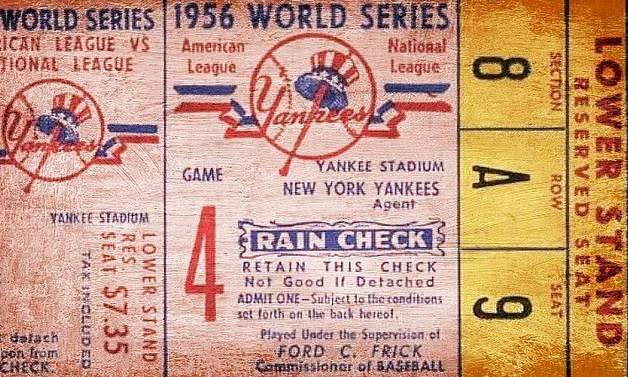“It’s never happened before in World Series history, and it hasn’t happened since.” Thus spoke Yogi Berra, the longtime catcher of the New York Yankees, right after his teammate Don Larsen pitched a perfect game, fifty-seven years ago today, against the Brooklyn Dodgers in the World Series. While the second half of Berra’s observation was not a particularly daring claim that day it still holds true in our time, as Larsen’s feat—retiring every batter he faced in a complete game—remains unique in the annals of baseball’s Fall Classic. By not allowing a single Dodger to reach base safely, neither by hit, nor walk, nor error, Larsen’s performance lacked nothing proper to the effectiveness of a pitcher. In the true sense of the word, his game was perfect.
If a man can be perfect for a baseball game, lasting a few hours, how much more must God be perfect for all eternity? One of the first facts that St. Thomas Aquinas establishes about God in his Summa Theologiae is the divine perfection. God is the universal principle of all that is, and He has no need or possibility to change in any way. “Hence, the first active principle must needs be most actual, and therefore most perfect; for a thing is perfect in proportion to its state of actuality, because we call that perfect which lacks nothing of the mode of its perfection.” Likewise, when we speak of Jesus as “perfect God and perfect man,” we mean that He, as one divine Person, possessed the fullness of both the divine and human natures, for “though He was in the form of God,” He “was known to be of human estate” (cf. Phil 2:6-7).
To be lacking in nothing seems to be possible for the Almighty alone. Yet in the Sermon on the Mount, as Jesus explains the fuller sense of the Ten Commandments, we find this exhortation:
Be perfect, just as your heavenly Father is perfect (Mt 5:48).
A tall order for sure! While we can attain temporary perfection on our own merits in several ways, such as pitching a perfect game, earning a perfect score on an exam, or performing a task with perfect timing, the precept to be perfect as God is perfect sounds like more than anyone could possibly live up to. Yet, we can reach our full perfection of eternal life through God’s grace, and by responding to His call to follow Him.
One would-be disciple of Jesus did find this call too difficult. The rich young man described in the Gospel sought eternal life, and lived the Ten Commandments fully. He still sensed that something was missing, and so asked Jesus what he must do to reach the perfection of heaven. Our Lord replied:
If you wish to be perfect, go, sell what you have and give to the poor, and you will have treasure in heaven. Then come, follow me (Mt 19:21).
The call to Christian holiness consists, not merely in adhering to a moral code (as the rich young man already did), but in following Jesus in a close relationship with Him, loving Him above all the goods of this world.
The rich young man, however, must have found it easier to pass a camel through the eye of a needle than to part with his many possessions. Granted, not everyone is called to give up all they have as their means of perfection. Living in the world and supporting one’s family requires money and possessions. But Jesus does call some more radically—to live more closely with Him in this life, to prepare for and witness to the perfection of the life to come—through consecrated religious life.
No one should enter religious life thinking that he or she is already perfect; anyone who does so might as well take the next bus home! Rather, we knock at the door because we know we are imperfect, and wish to follow Christ’s particular call and learn from Him. Practicing poverty, chastity, and obedience—the three evangelical counsels that Jesus recommends in the same chapter of Matthew’s Gospel, by which He lived Himself—constitutes a school of perfection, in which the Apostles were the inaugural class.
Shortly after the rich young man went away sad, Peter asked Jesus, “We have given up everything and followed you. What will there be for us?” (Mt 19:27). Jesus promises a hundredfold reward to those who sacrifice the goods of wealth, marriage, and power for His name and the sake of the Gospel, but His promise of eternal life extends to all of His disciples who love Him above all things. No matter our state in life, God calls us all to be holy—and to be perfect. For us mere mortals, this is impossible to accomplish ourselves, but “for God all things are possible” (Mt 19:26). His grace perfects our weak human nature.
✠
Image: Erik Prunczyk, World Series Game Four Ticket, 1956







